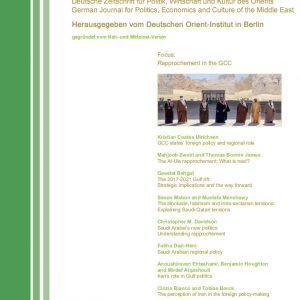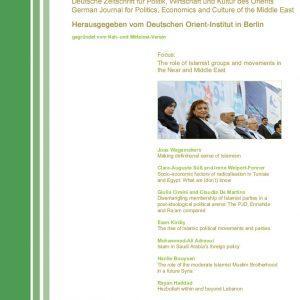Shop
Showing 161–176 of 323 resultsSorted by latest
-

Iran’s role in Gulf politics
7,90 €incl. VAT
Add to basket -

The blockade, Islamism and intra-sectarian tensions: Explaining Saudi-Qatari tensions
7,90 €incl. VAT
Add to basket -

Saudi Arabia’s new politics: Understanding rapprochement
7,90 €incl. VAT
Add to basket -

The perception of Iran in the foreign policy-making of the GCC monarchies
7,90 €incl. VAT
Add to basket -

Saudi Arabian regional policy
7,90 €incl. VAT
Add to basket -

The Al-Ula rapprochement: What is next?
7,90 €incl. VAT
Add to basket -

The 2017-2021 Gulf rift: Strategic implications and the way forward
7,90 €incl. VAT
Add to basket -

GCC states’ foreign policy and regional role
7,90 €incl. VAT
Add to basket -

Orient III 2021
26,00 €incl. VAT
plus Shipping Costs
Select options This product has multiple variants. The options may be chosen on the product page -

Disentangling membership of Islamist parties in a post-ideological political arena: The PJD, Ennahda and Ra’am compared
7,90 €incl. VAT
Add to basket -

The role of the moderate Islamist Muslim Brotherhood in a future Syria
7,90 €incl. VAT
Add to basket -

Socio-economic factors of radicalisation in Tunisia and Egypt: What we (don’t) know
7,90 €incl. VAT
Add to basket -

The rise of Islamic political movements and parties
7,90 €incl. VAT
Add to basket -

Orient II 2021
26,00 €incl. VAT
plus Shipping Costs
Select options This product has multiple variants. The options may be chosen on the product page -

Islam in Saudi Arabia’s Foreign Policy
7,90 €incl. VAT
Add to basket -

Hezbollah within and beyond Lebanon
7,90 €incl. VAT
Add to basket



